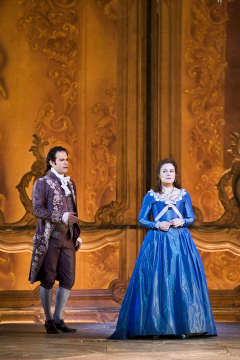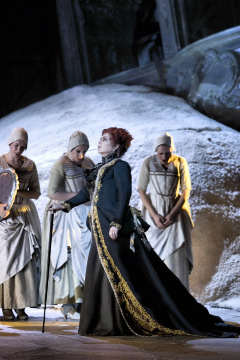|
Editorial Board
Melanie
Eskenazi
Webmaster: Len Mullenger
|
Seen and Heard Opera Review
Tchaikovsky: The Queen of Spades Soloists / Orchestra and Chorus of the Royal Opera, Covent Garden / Semyon Bychkov (conductor). 11.11.06. (ED)
Gherman: Vladimir Galouzine Count Tomsky: Vassily Gerello Prince Yeletsky: Gerald Finley Countess: Larissa Diadkova Liza: Mlada Khudoley Paulina: Enkelejda Shkosa Chekalinsky: Robin Leggate Surin: Jeremy White Chaplitsky: Andrew Stritheran* Narumov: Krzysztof Szumanski * Major-domo: Alasdair Elliott Governess: Carole Wilson Masha: Elizabeth Sikora Prilepa: Kishani Jayasinghe * Hermann: Vitali Tarachenko * Jette Parker Young Artist
Director: Francesca Zambello Set Designs: Peter J. Davison Costume Designs: Nicky Gillibrand Lighting: Mark McCullough Choreography: Vivienne Newport
I understand why the public takes Eugene Onegin to its heart with greater readiness than it does The Queen of Spades, nonetheless I feel Onegin to be the weaker work when all is said and done. There is barely a melody in Onegin that is not memorable or a dramatic opportunity that is left unexploited. The Queen of Spades contains less outwardly memorable melodies perhaps, but is in no way short of drama: Pushkin’s literary source sees to that. The crux of the issue is, however, in the nature of the drama and the influence it exerted on Tchaikovsky in composing the opera. The work paints a view of obsession’s self-destructive nature in several of its aspects, yet it would be a mistake to think the work totally doom-laden. The courtly masque in Act II serves to lighten the mood at least temporarily, though it bears little relation to the main thrust of the plot.
Just as Tchaikovsky and his brother Modest took some liberties with Pushkin’s original story, so this production took liberties with the staging of the opera as a whole. Ostensibly placed within a grand theatre setting, the stage is flanked by ornate boxes from which the action is occasionally observed and commented upon. The intended impression of grandeur would have been realised more strongly had the fabric of the set been better finished: the lighting often exposed the structural scaffolding, which could have easily been masked. Other visual oddities presented themselves within the on-stage theatre: a snow drift (ostensibly to aid the entrance of characters) and an incongruously sited gambling den.
Quite why such decisions were taken does not really become clear as the evening progresses, and given that half of the experience of live opera is in the seeing of it one is entitled to ask why one sees what one does on stage. The question is urgent, given the opera has received indifferent stagings by major UK companies: Glyndebourne too seemed unwilling to give the work its due in the 1990s. More pressing in respect of this Covent Garden production is the fact that a top-notch cast has been assembled, and surely they deserve better.
Vladimir Galouzine’s renown in the role of Gherman precedes him, and he is currently the role’s leading exponent. As strong of voice as of acting skill he vividly portrays the gnawing effects of obsession upon human mind, psyche and body. The effectiveness of the portrayal though would only be somewhat realised without an equally strong Countess who keeps the secret of the winning cards. Larissa Diadkova’s Countess is not just one of hautiness, but acutely aware of the power of her secret. Old, world-weary, hers is a life that has been eaten away at by obsessive guarding of her knowledge. In death she divulges the secret to seal Gherman’s downfall, and this supernatural act was a highlight in terms of vocal resourcefulness.
Liza, Gherman’s ill fated lover, was affectionately portrayed by Mlada Khudoley, the difficult music sung with confidence and style. The realisation that the love she feels for Gherman will never be reciprocated made one feel for Liza as a character more than any other factor. Gerald Finley held his own as Prince Yeletsky with fine singing and sureness of line, even if his tone lacked some authentic Russian bite when compared to other voices around him. Vassily Gerello’s Count Tomsky is a prime example of a real Russian baritone, flexible of voice yet firm. In short, impressive singing that sits well alongside his very macho acting of the part.
Fine singing though found its complement in the pit, with Semyon Bychkov’s sensitive and astute conducting bringing out requisite drama from the score, to which the orchestra certainly responded. As much a part of Bychkov’s realisation was acknowledgement of the part that Tchaikovsky’s frequent sparse orchestration plays in the opera. That he found much of power to say in the more intimate moments when quieter dynamics are employed says something for his musical and dramatic instincts. Indeed, of such things memorable Tchaikovsky interpretations ultimately made.
Evan Dickerson
Back to the Top Back to the Index Page |
| ||
|
||||




